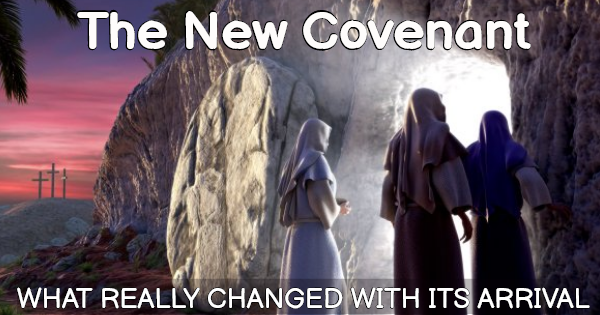What Really Changed With the Arrival of the “New Covenant”?
A Study Outline
I. Many covenants have been made between man and God throughout history: witness Adam, Abraham, Noah, and other patriarchs who contracted with God.
II. The New Covenant we are concerned about here hinges upon the coming of Jesus Christ in the flesh, His sinless life, His death and resurrection for the atonement of sin, and His promise for men to attain eternal life.
A. His life was sinless, and as the perfect sacrifice He died for canceling the mistakes of sinners; we are saved by His life. Romans 5:6-10; Hebrews 2:16-18; 4:14-15.
B. The first covenant God made with Israel was an “external covenant” written on tablets of stone — the Ten Commandments and the statutes and judgments — though Yahweh still wanted the law to be internalized through His Spirit. Exodus 19:3-6; Joel 2:12-13.
C. The new covenant God made with Israel was an “internal covenant” written on the “tablets of our hearts” of those the Father calls and chooses, and in whom He places His Spirit. II Corinthians 3:1-3.
1. This covenant existed long before Christ came to the earth as flesh, and means that Christ’s sacrifice had to be retroactive, covering sins both past and future.
a. Adam’s time: Genesis 2:15-17.
b. Abraham’s time: Genesis 15:1-6; Romans 4:1-13.
c. David’s time: Psalm 34:17-22; 51:1-19.
2. The covenant was the laws of God placed within one’s inner being so a person would desire to accomplish God’s will. Hebrews 8:7-13; Jeremiah 31:31-34.
III. What changed with the arrival of the new covenant?
A. The laws of God were (are) placed within the hearts of men, of those whom He calls and chooses … as discussed above. John 6:44-45; Acts 2:38: Romans 8:7-11.
B. Gentiles can now partake of the internalized Holy Spirit. Acts 2:14-21 (from Joel 2:28-32).
1. Before this time only those of the chosen line from Seth were given God’s Spirit: Seth —> Noah —> Abraham —> Israel
2. Cornelius and his associates were some of the first Gentile converts. Acts 10:24-48.
C. Symbols for the Passover were changed, and the animal sacrifices and oblations were removed, but the laws of God — including the Feasts and Sabbath — were not changed.
1. With Christ’s coming and crucifixion and resurrection, the sacrifices and oblations were finished.
a. They had been added to the original law because of Israel’s sins in the wilderness. Jeremiah 7:21-23.
b. Christ’s actual sacrifices, pictured by the animal sacrifices, ended these rituals. Hebrews 10:1-9.
2. Christ came to “magnify the law and make it more honorable”, not to take it away. Isaiah 42:21; 51:4; Matthew 5:17-19; I John 3:4; 5:3; Psalm 119:172. In Matthew 5:17, the word fulfill is the Greek word pleroo [Strong 4137, “to make replete, i.e. (lit.) to cram (a net), level up (a hollow), or (fig.) to furnish, satisfy, execute, finish, verify”; replete means “plentifully supplied, filled, or stuffed”.]. There is no way that this statement can mean taking away the law, but rather it means exalting it and showing us the proper to live it to the “crammed full” limit, making the law replete in our lives … not lived by the traditions of men as the Judean elders believed, who held the people captive to fear and bondage.
3. Christ substituted bread and wine to ingest — as His body and blood — for the Passover in place of the actual sacrificial lambs and other Passover rituals (see Exodus 12). Even so, unleavened bread was eaten by the Israelites the night of the Passover and may have drunk wine as well … without understanding the symbolism, of course
4. The Sabbath and Holy Days stand or fall together, all being mentioned in Leviticus 23.
a. The Holy Days were specified at Creation. Genesis 1:14.
b. The codified Holy Days were given through Moses at Mt. Sinai. Exodus and Leviticus
c. Jesus Christ kept the Holy Days as an example for us to follow. I John 2:6.
d. The New Testament Church kept the Sabbath and Holy Days.
e. We must keep these days today.
IV. In summation: Nothing of any substance changed for the “chosen line” (Seth to Israel) ecclesia with the coming of the new covenant, but things changed dramatically for the Gentiles. Those whom God called after Pentecost in 30 A.D. could now be a part of the ecclesia as well. The new covenant also removed the animal, meal, and other sacrifices and oblations, and added profound symbolism to the bread and wine taken at the Passover. The “new covenant” is really the “pre-old covenant”, the way that things essentially were amongst the pre-Israelite patriarchs and other servants of God who were called in the days of old (see Romans 11:1-5).


